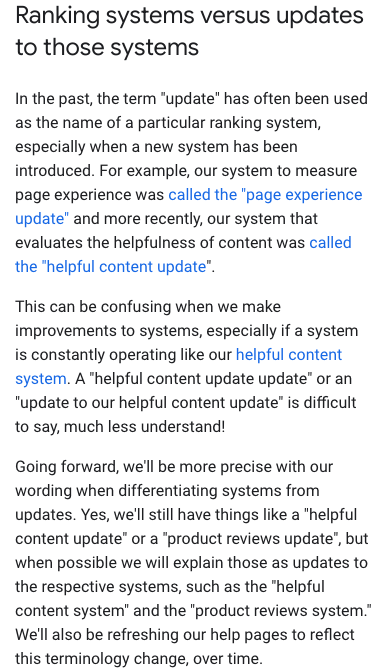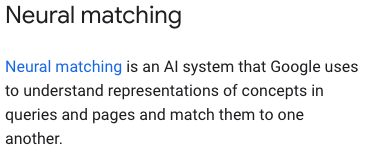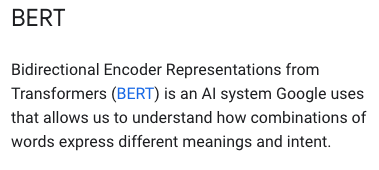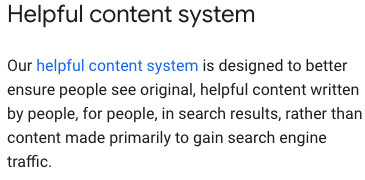Important news about Google this week
Looking for the premium members version? Log in here or become a member.
There are two big topics discussed in newsletter this week, Google’s new guide to their ranking systems, and also a new spam policy. I’ve got a bunch of personal news in this episode and a few stories. The exciting news is that I’ll soon have my book ready, and with it, a course to help you understand Google’s algorithms and improve site quality.
1) Google published a thorough guide to their ranking systems
I am beyond excited about this guide, Google has given us new terminology to use when we talk about their algorithms. Some things are updates, like the helpful content update, but then the helpful content update was an update to the helpful content system.

In the paid version, I’ll talk about several of these systems and explain a little bit about why I am so darn excited about this document. It helped fill in a few gaps in my brain when it comes to understanding how Google’s algorithms work.
Here is my tweet thread where I share my initial thoughts on reading this guide.
Google has published a new guide to their ranking systems‼️
Oh wow…this is really good.https://t.co/fxCxqPbP3N
Here's my summary (live blogging as I read it because I'm so excited🤓)
👇— Marie Haynes (@Marie_Haynes) November 21, 2022
2) New spam policy – policy circumvention
If you break Google’s spam guidelines repeatedly there could be consequences.
New spam circumvention policy can apply to those who
➡️break the spam guidelines
➡️continually try to publish content that's been "made ineligible from surfacing"
➡️Use multiple sites to spamMight include not being eligible for Top Stories or Discover.https://t.co/qJCWanRzsV pic.twitter.com/BoroPlAgTu
— Marie Haynes (@Marie_Haynes) November 22, 2022
(Discussed more down below for paid readers.)
An announcement and a new direction for Search News You Can Use
I have not been this excited about Google’s algorithms since, possibly…ever. This week Google published a new guide to their ranking systems that thoroughly explains how Google ranks their search results. This comes on the heels of last week’s big news from Google that E-A-T is assessed for every single query on every single search performed on Google.
This was a fun week for me. I’ve obsessed over Google’s algorithms for 14 years. I’ve pored over everything I can learn about E-A-T since mid 2017, and helped many businesses in the process. Seeing the industry progress from the “E-A-T is not a ranking factor” discussions to where we are today has been extremely rewarding.
This newsletter will be a little different. It marks the start of a new direction for me — one that hopefully will allow me to help many people.
I would like to share more with you about how important it is for us to understand how Google has changed, and also to tell a bit of my story.
Keywords are everything to SEO, right?
My very first SEO related post online was in the SEO Chat forums which sadly, no longer exist. I asked a question about keyword density – the number of times a word appears on a page divided by the number of words on that page. At the time, Google was a rules based algorithm – one which was relatively easy to manipulate. There was a day where all it took to manipulate those rules and rank well on search engines for a keyword was to include that keyword as many times as possible on a page. In some cases people would put white keywords all over the page on a white background to manipulate this ranking factor.
The SEO community eventually developed theories about what particular keyword density was most likely to help vs hurt. By the time I asked the question on keyword density, in 2008, it was already a laughable question. Only a real noob would ask it. And yeah, I got laughed at.
Today’s SEO knows that while keyword density is unlikely to be important for us to focus on, keywords are incredibly important.
A couple of weeks ago in newsletter I shared a basic GSC keyword optimization exercise with you. Here’s what we did to optimize my article on E-A-T for a particular keyword:
- Looked at my GSC queries report to find keywords that I was ranking well for but not in the top results
- I was ranking for “E-A-T guidelines” but not as well as expected. The words were not on the page at all
- I added those words to a heading, to the text and also to new internal links using “E-A-T guidelines” as anchor text
Last week I was going to report on how much my rankings improved for “E-A-T guidelines”, the keyword we optimized and um…its rankings…uh…didn’t improve at all. Nothing changed.
I am a fraud.
Haha…just kidding. This is SEO…we test things, we learn, and then we keep improving!
I didn’t think much of this until last night when I couldn’t stop pondering over Google’s new ranking systems documentation.
I could not stop thinking about neural matching.
Neural matching is so cool
Neural matching uses pattern recognition to try and mimic thinking like the human brain does. It relies on artificial intelligence (AI) and machine learning (ML) to improve over time. Neural matching is an emerging technology and it’s not fully understood, so I am definitely not an expert on this topic.
Here is what Google’s ranking guide says about neural matching:

Neural matching matches concepts in queries with concepts on pages.
Let’s take a step back and think of the query I was trying to rank for, “E-A-T guidelines”.
The first step in Google’s algorithms is for the algorithm to understand what the searcher is looking for.
They use an AI system called BERT to better understand the meaning of my query and my intent.

RankBrain, another AI system, can take the words searched and determine what concepts are represented in my query. Not what exact keywords the searcher typed in, but what is the general concept they are trying to research?
Neural matching can find pages that contain that concept and in some cases the passage ranking system may find sections of pages that discuss that concept.
Upon reading the information on Rankbrain, BERT and Neural matching, I had a lightbulb moment.

It doesn’t matter whether a search is “E-A-T guidelines”, “E-A-T recommendations” or “Google’s rules for E-A-T”. While those are all different keywords an SEO could optimize for, they all represent the same concept.
And then I felt sick.
I had this sudden realization that so much of the daily work SEOs all around the world do is likely a colossal waste of time. So much.
There is still value in much of the keyword research we do. We likely should be focusing more on entity, topic and subtopic research than individual keywords…many already are.
But think about this. When you work on SEO for your website, how much of your time is put into optimizing for the rules based algorithm we know of Google 15 years ago? And how much effort do you put into optimizing for Google’s machine learned, AI powered algorithms that aim to rank pages deemed to be helpful and trustworthy.
Here’s why the SEO industry is so lost
I love the SEO industry. We are such a group of giving, helpful people.
How did you learn SEO?
If you went to school to learn SEO, much of what you have learned is outdated before you even graduate. Google changes so fast. I can barely keep up with what’s important in Google’s algorithms and I’ve made it my full time job to study this stuff. I have not seen the curriculum of college and university courses taught on SEO, but my bet is there are very few that can thoroughly explain what E-A-T is and you cannot rank for important queries without it. Google has told us that E-A-T is a vital component that is pervasive throughout everything that they do.
Many of you learned SEO online by reading the recommendations of those in the industry who experimented, pushed Google’s limits, and reported back on what was working for them.
If someone is searching online for information on how to do SEO, every single course or beginner’s guide tells us the same thing:
- Use tools, SERP analysis and competitor analysis to do keyword research.
- Write content based on those keywords.
- Learn to keep your site technically sound.
- Get links.
Google’s guide to creating helpful content — the type of content they want to rank — gives us many questions we can use to analyze our sites. These in particular are incredibly important. Yet, I do not see any guides that tell us that we need to focus on these things.
- Does the content provide original information, reporting, research or analysis?
- Does the content provide insightful analysis or interesting information that is beyond the obvious?
- If the content draws on other sources, does it avoid simply copying or rewriting those sources, and instead provide substantial additional value and originality?
and most importantly,
- Does the content provide substantial value when compared to other pages in search results?
We do keyword research based on what is currently available in Google’s index. Why would Google want to rank a piece of content that contains the same information as everyone else? If Google wants to rank content that provides original ideas and is substantially more valuable than any other page online, then why is the foundation of most SEOs content creation based on writing about the keywords everyone else is using?
It is not hard to imagine an algorithm that can identify if a piece of content covers the concepts normally discussed and also concepts that are related to the topic, but not covered in other posts that exist online. I can think of all sorts of ways Google could use AI to identify content that is substantially more thorough.
I believe we have only just seen the start of what Google’s helpful content system is going to do.

Google told us they will continue to refine the helpful content system. For now, we have seen some sites with large amounts of AI generated content get hit. Like any machine learning algorithm, I expect the helpful content system will learn and get better and better at detecting when content is likely to be helpful to people.
We are in for some wild times.
The number one thing I would optimize for is helpfulness.
More of my story
Not too long ago, I had two client calls in one day. The first was a call with a large nationally recognized brand. I had just completed a traffic drop assessment for them. It was a fascinating case of a large site that had overused automation and had created boatloads of content that was half decent but by no means unique and original or substantially valuable. They suffered a catastrophic May core update hit. We had an excellent call and I shared with their marketing team some ideas to help them focus on their area of expertise and use it to create content that truly helped people. We all left the call invigorated by the ideas that came out of this meeting.
I then jumped on a call with a newsletter subscriber who had paid for a strategy session with me — a small e-Commerce website run by a husband and wife team. They told me they had listened to my podcast for years and that much of their success came from things they had learned from me. That is so cool!
They built a website and learned SEO and made enough money to make this their family business and quit their regular jobs. They learned SEO by consuming information from people online like me, Glenn Gabe, Lily Ray, Barry Schwartz and others whom I often quote in this newsletter. With recent Google updates, the business was seeing some declines.
When we looked at examples of pages that were starting to outrank this site, it was obvious to me that while this site was doing a lot of things right, competitor’s pages were better at understanding what it was a searcher wanted to find, and then presenting that information in a way that was quick and easy to find. We spent our hour brainstorming over how the site could provide a better user experience, and how they could better make use of the years of first hand expertise they had accumulated after years of talking to customers about this particular type of product.
One of these clients paid me a five figure fee for my advice. The other, a few hundred dollars.
Guess which one I found more rewarding?
I am at a point in my career where the logical choice for me would be to raise my consulting fees and personally work with a small handful of select clients.
But what gives me joy is helping the small sites…those of you who are learning like I am, and just trying to figure out what direction I should be headed.
So, I sat down and asked myself some questions about what my goals were in life.
Why do I do this?
I asked myself what my purpose in my work is. Why do I do this?
My personal goals amount to this:
- help a lot of people
- make money from the skills I have learned
- for me and my family to be healthy and happy
Years ago I thought that the way I could help more people was to hire people and train them. I was able to help more people by having a team of SEOs working with me, but on the grand scheme of things, not a lot more.
There is one clear and obvious way that I can use the skills and knowledge I have to help a large number of people, and that is to create a course.
I’ve been writing my next book, one to help people understand Google in 2023 for several months now. When Google released their information on their ranking systems this week it helped me fill in the gaps that were missing to make this book complete. My course is partially written as well. It is so helpful. I’m on track to launch in January, but we will see how things go.
So here’s my announcement:
I’ll be halting consulting and speaking engagements for a while so that I can focus on creating a course to help you do better SEO. If you’ve booked a review or meeting with me, or if the MHC team is doing work with you, don’t worry, nothing changes for you. I’ll still be producing podcast as well, but the episodes may not be as long for the next few months.
Newsletter will continue but will look a little different. Each week you’ll see:
- A short list of what’s important to know in the SEO industry (in the free and paid version)
- Important news about Google’s algorithms for local businesses (free and paid)
- A blog post from me on what I found interesting about Google and SEO this week (paid only)
- Some links and tweets on things I normally would have covered in detail in previous newsletters. For example, I’ll still share some interesting tools, stories about AI and information about the creator economy. I just won’t be writing stories about each item. (paid only).
If you’d like to be notified when my book and course are ready to purchase, you can drop your email here and I’ll send you a message when it’s ready.
I hope you’re as excited about this as I am! For those who have asked how you can help me while I write this content, the best way is to encourage people to sign up for this newsletter. One day I’ll revive the affiliate program I used to have and we’ll get even more folks in here learning about where Google is headed.
What’s in the paid version?
This week, for my paid readers I go into more detail on Google’s new ranking system terminology. I share how I have changed my audit template to be centered around assessing the effect of each of these systems (product review, helpful content, MUM, BERT, etc.) on the site. I also share more about how I feel that Google’s October Spam Update was a huge step forward in detecting spam. If you do build your own links to manipulate Google, you are going to want to read the information about the new policy for repeatedly circumventing the spam policies. There is also an interesting Mastodon thread where Gary Illyes possibly gives us some insight into pages stuck in “discovered, not indexed” in GSC.
As usual, we go through new and exciting SERP features. There’s more clarification on structured data penalties as well.
If you want to be ahead of the curve in understanding where Google is headed with search, it’s well worth the $18 per month.
News about Marie
I truly am so excited to be dedicating the majority of time to finishing my book and course over the next few months. I love writing so much.
I am really interested in what Elon Musk’s plans are for improving Twitter. There is so much discussion on Twitter about Elon’s personality. Whether or not you like the man, there is no denying that he is brilliant. He has built a car company, given satellite internet to the world, and learned to build rockets and create a new spaceflight company. I am confident he will transform Twitter.
I see his vision. It’s smart and a little scary. Some say it will be impossible to do (as was going to space or building electric cars). He wants to make it as easy as possible for people to profit from their expertise.
Picture this. I have 50K followers on Twitter. I spend hours most days sharing my expertise with my followers. When I publish my book, as it stands now, I’ll publish it as a PDF on my website. I can inform my audience about it by tweeting, and they can click on a link, go to my website, click on a Paypal link, buy the product, go back to my website, and download the product.
But what if I could just add my book to a products section in Twitter and in any of my tweets I could include an icon people can tap to buy it? You’ll need to be verified to do that. But everyone will be verified. We’ll get over the horribleness of having to pay $8 per month. If you’re not verified you won’t get much attention on Twitter.
Likely Twitter will give you the option to connect your bank account. Who knows, perhaps Dogecoin will be Twitter’s currency? Regardless, it will be incredibly easy for you to tap a button and in an instant my book is in front of you and your money is in my Twitter bank account.
You might say, but lots of platforms could do this? The thing is, the world’s experts…the people with knowledge worth sharing…are already on Twitter. They know how to use it. Their audiences are there.
Twitter is going to try and compete with YouTube – better video and more $ for creators.
If you are an expert with a decent Twitter following, you might have a new income source soon. pic.twitter.com/Lwteh7CzJx
— Marie Haynes (@Marie_Haynes) November 22, 2022
I predict Twitter will be a vastly different place soon.
Podcast
There’s no podcast episode this week, but if you missed last week’s audio-only episode I talked a lot about E-A-T.
The video episode of this podcast will be out soon. (Google’s ranking guide stuff cost me a couple of days this week!)
Guide to understanding the October Spam update
The guide is done, but it’s not up on the website yet. It will be very soon. I’ve decided I’m going to give the spam guide to all of my paid subscribers. I really do hope to have it available for you next week.
Important SEO news for small businesses
Although I do not do much local SEO myself, I want to continue to publish important local SEO news for free. I know that so many of my readers are small business owners who benefit greatly from this. If there’s anything I can do to help make the local SEO information more valuable for you, please do reach out to me via Twitter DM to let me know.
Here is what I found to be interesting in Local SEO this week:
Google is suggesting service areas to add to your business profile. Useful addition 🙂 https://t.co/p7nUhuG9lU
— Joy Hawkins (@JoyanneHawkins) November 24, 2022
Finally got the official answer from Google on what's happening with photo insights: https://t.co/Z2nriRarCm
— Joy Hawkins (@JoyanneHawkins) November 16, 2022
BEWARE! There's been an increase in fake ownership requests on business profiles.
Please keep an eye out to make sure you or your clients don't fall for this scam. 🥸 👀https://t.co/0TrEHsP31Y
— BrightLocal 🇺🇦 (@brightlocal) November 21, 2022
You can increase your local rankings OVERNIGHT by adding additional categories to your GBP. 🚀
A lot of business owners are missing out on this powerful ranking booster. Here’s a quick 60 seconds on how to use it and start ranking for more terms by tomorrow! 🪄#localseo #seo pic.twitter.com/CaCXe8A9ZZ
— Darren Shaw (@DarrenShaw_) November 21, 2022
Focus on Local? Another case study from @JoyanneHawkins -> Is Google Looking for Diversity in Reviews? [Case Study]
"So, is Google keeping one-star reviews higher up to show that no business is perfect?" Check the post for Joy's findings: https://t.co/665wWzCCul pic.twitter.com/jNbR2zntCh
— Glenn Gabe (@glenngabe) November 21, 2022
The Products section of GBP has a very prominent position in the Business Profile and can grab the user’s attention. So why don't people use it❓
It’s likely because people think it can only be used for physical products, but this is not the case…
2/4
— Darren Shaw (@DarrenShaw_) November 17, 2022
Thank you for your patience as I experiment with new formats for newsletter. Damn I love writing this stuff. I appreciate that you like reading it!



